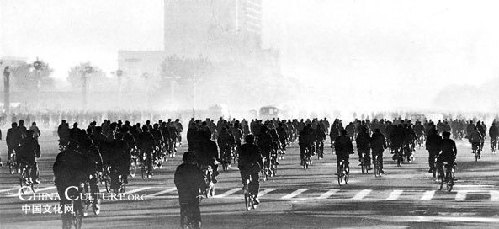|

In early 1980s, the Chang'an Avenue was still a street mainly for cyclists in Beijing. File Photo
Roused in the morning by loudspeakers broadcasting propaganda. Banned from traveling outside international zones. Drinking Five-Star liquor at one of the few international hotels because it was the only place with air conditioning. Life has changed dramatically for expats in China since the "cultural revolution" (1966-76).
Today, foreigners come in their tens of thousands and live where they choose and travel where they like. Broadband connections keep them in touch with friends and family around the world. They download their favorite programs or music and buy the latest DVD movie.
Expats who knew the country then and now say China is no longer unique. It has an international uniformity. The infrastructure, stores and brands are much the same as anywhere else in the world. They look back, sometimes with rose-tinted spectacles, on the way China used to be.
CNN bureau chief Jaime FlorCruz was one of 15 students and youth leaders from the Philippines invited here for a three-week study tour in 1971, by the Chinese People's Association for Friendship with Foreign Countries. The 20-year-old's first impression of Beijing was of it being "steeped in revolutionary fervor".
"Mao (Zedong) statues and billboards with Mao's quotations stood tall in strategic places. His Little Red Book and other propaganda materials were available in various languages, in many places for free. The Chinese we met all wore Mao jackets and caps, mostly in colors of blue and green," he said.
"We occasionally spotted detachments of Red Guards and civilian militia marching otherwise, Beijing's streets seemed calm and clean. Mostly we saw cyclists - tens of thousands of them - going to and from work."
FlorCruz, an exile from the Ferdinand Marcos-led Philippines, experienced the trials and tribulations of life in China the following year when he was sent to the countryside. He briefly became a farmer in Hunan Province and a fisherman in Shandong Province. He returned to Beijing a few years later to study Chinese history and later became a reporter for Newsweek and Time.
There were few foreigners allowed into China during this period, especially from Western countries. FlorCruz said those that did make it were "segregated" and assigned housing according to their status. Students stayed in dormitories, foreign experts were billeted in apartments at the Friendship Hotel, while diplomats were ensconced in diplomatic compounds. Foreigners did not have the right to choose accommodation until 2003.
Not allowed
"Chinese took risks to befriend foreigners. They could get into trouble from their work unit, their bosses, or the police for simply being too cozy with foreigners. They faced the prospect of being accused of leaking secret information or spying. Until the mid-1970s, liaisons and marriage between Chinese and foreigners were taboo. The friendships I made then have stood the test of time."
|
